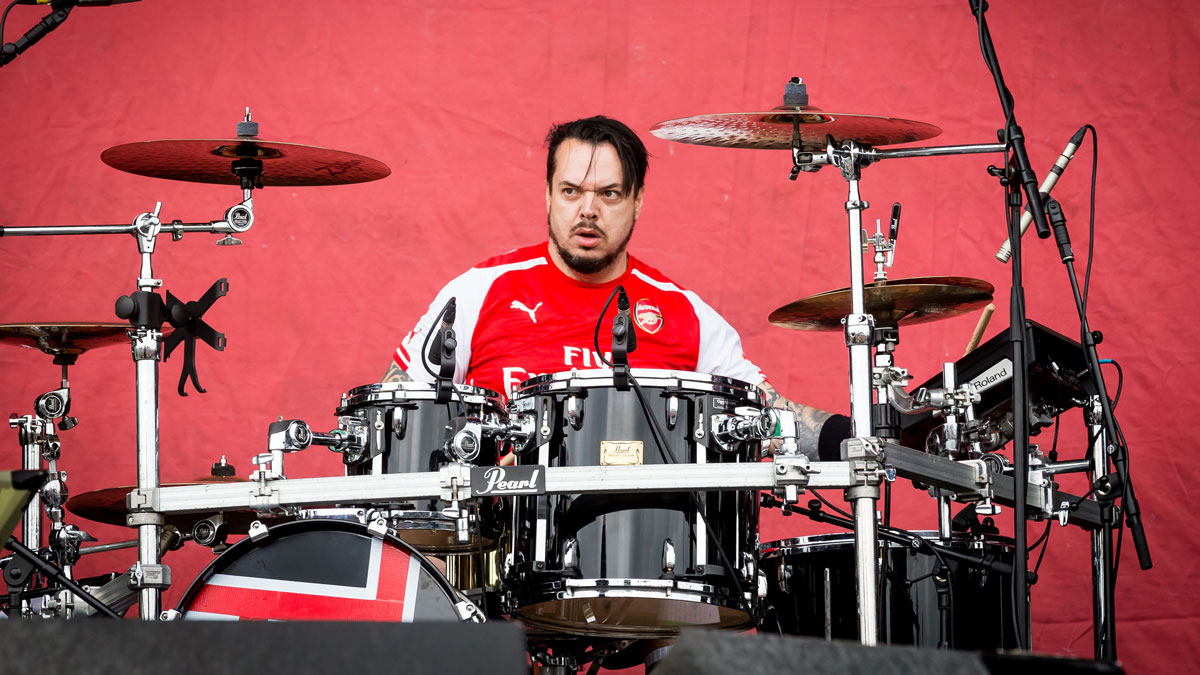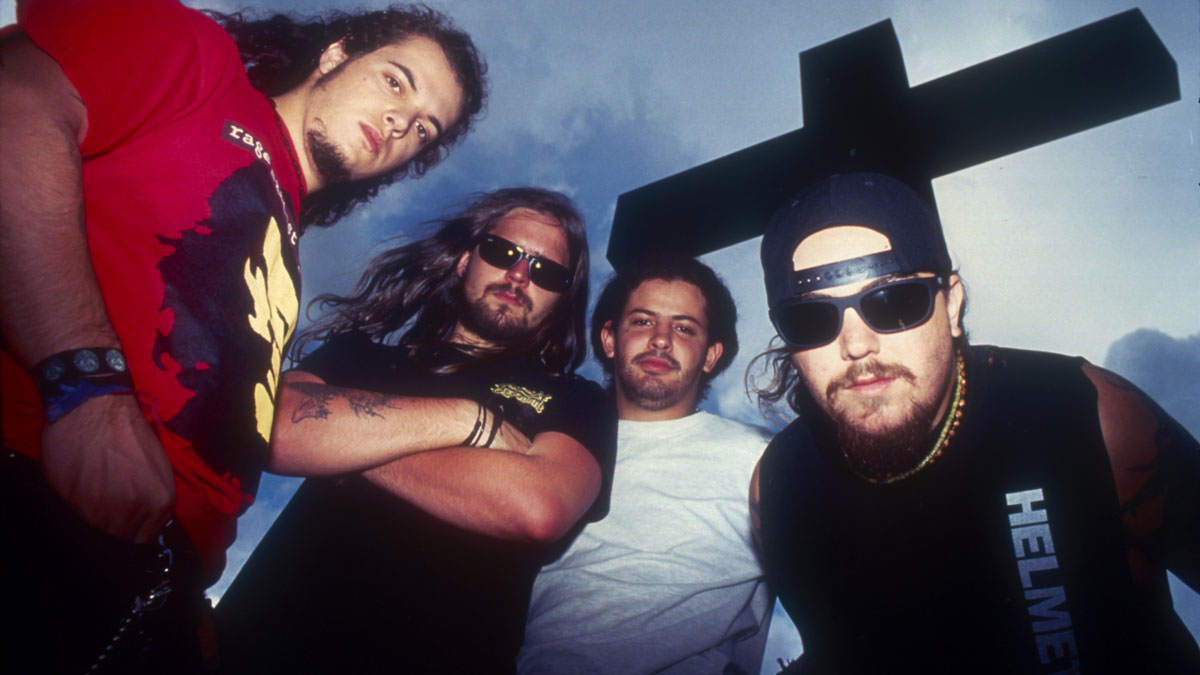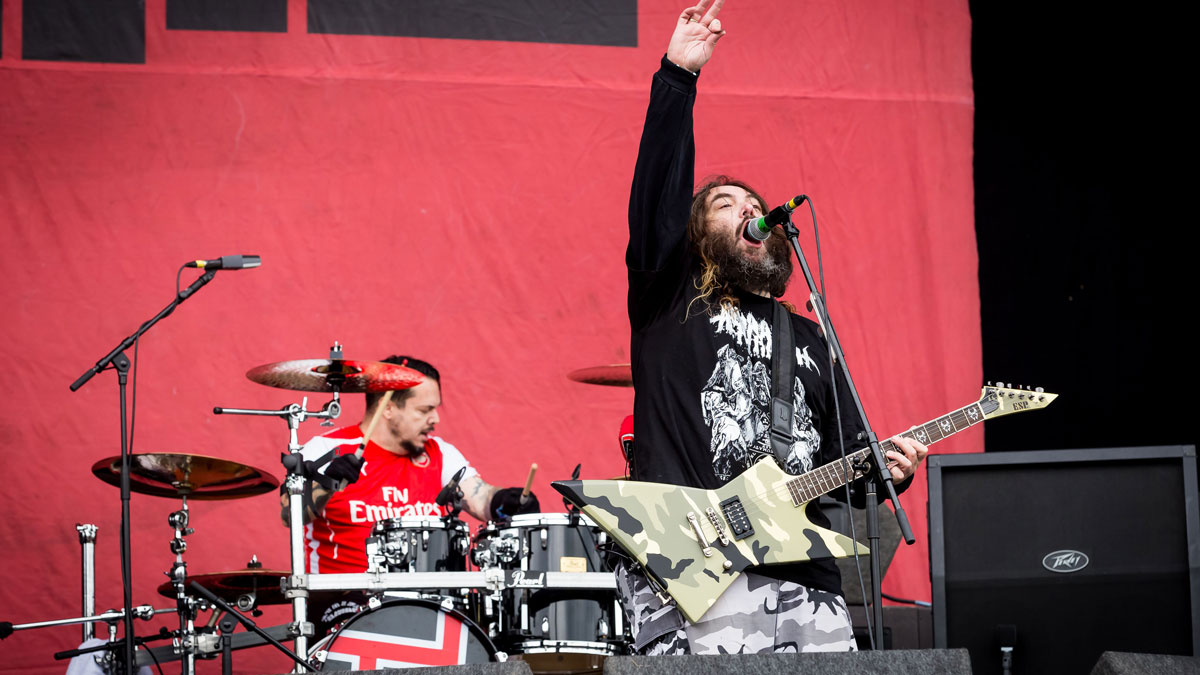Sepultura's Iggor Cavalera: "It was too much theory; all I wanted to do was to play some drums. I dropped out after a few weeks."
The Brazilian drum hero talks Roots, rhythms and the future

Back to his Roots
If you sit down for a chat with Iggor Cavalera you should be ready for an expedition around the map.
When we sit backstage at Donington ahead of Iggor’s Download festival show, in which he and brother Max perform Sepultura’s classic Roots album, we begin by hearing all about the Brazilian samba rhythms that shaped Iggor’s formative years.
From there we dart to the UK as he shares stories of his earliest drum heroes, and then on to Africa and Japan as Iggor recounts his own musical explorations; expeditions that he set out on in the quest of new drum sounds, feels and rhythms. It’s enough to give us a bout of travel sickness, and just as we’re recovering he mentions taking residence behind the kit for Belgium’s finest, Soulwax.
But we shouldn’t be surprised at such tales, as Iggor has always proudly worn his eclectic musical background on his sleeve. Whether that be through the pounding tribal rhythms that punctuate much of Sepultura’s back catalogue or the Kodo-influenced work on the band’s Against album, Iggor is a drummer that has cast his net far and wide in a constant pursuit of drumming excellence.
So, when we had the opportunity to chat with the 46-year-old during a rare time of reflection on the Return To Roots tour, we grabbed it with both hands.
What did you first start playing drums?
“Drums for me was my first real passion, that and football, from when I was about six or seven. I tried to get some drum lessons and I hated it. It was too similar to what was happening in school.
It was too much theory; all I wanted to do was to play some drums. I dropped out after a few weeks.
"It was too much theory; all I wanted to do was to play some drums. I dropped out after a few weeks. I just started playing by myself at home to records, that is how I learned.
"I always tell young drummers that there is no right or wrong way. For me this was the best way but there are some awesome teachers out there. I wasn’t lucky to get an awesome teacher.”
Who and what were your early influences?
“At first I was really into samba rhythms. I would buy a lot of records with my dad. As I got into rock and one of my favourite drummers of all time is Bill Ward. I listened to the Sabbath records and realised that he had something.
"Later on, the more I studied the way he played I could see he was a very creative drummer. He is very creative, that is more important to me than being super technical or super fast. Drummers like him and Dave Lombardo sound like they write riffs with their drums. That is the coolest thing that you can do.”
So, your style was a combination of those samba rhythms and the jazz-influenced rock feel of Bill Ward?
“The samba thing was a natural thing when I started and then in my career I can see where at one point I saw that I could incorporate a lot of those rhythms. I could incorporate the Latin stuff and samba into my playing. The Afro-Brazilian beats started fitting in more.
"When I did Schizophrenia or even Beneath The Remains I was trying as much as I could to be a metal drummer and I wanted to do s*** like Lombardo and Tom Hunting from Exodus.”

Breakthrough days
Were you jamming with Max from a very early age?
“By the time I was 12 me and Max were already messing around and playing together. By 14 I was recording our first EP. I was really lucky to start so early on. I’m glad to have started early so I can still perform now with all of the energy. I don’t know if I’d be able to do that if I had started later.”
It’s more than 30 years since you formed Sepultura; how do you maintain the energy to play beats written when you were a teenager now that you’re in your mid forties?
“It is a challenge, but the more you play the more you learn about yourself. I even advise a few friends on how important it is to have the same level of energy from the beginning to the end of a show. I see a lot of drummers on the first song they go crazy and halfway through you can see they struggle.
"It’s like a marathon, you can’t sprint through the first track. You learn all of this. Warming up as you go is important as well. That is important when you’re 20 years into a career and have to perform at the same level.”
What are your memories of your early studio experiences with Sepultura?
“It was crazy. I had never been to a studio before when we did our first EP. I didn’t have a complete drumset at that time. I only had a snare, a floor tom and a cymbal; that was my rehearsal kit.
"There are tracks on the first EP where I don’t use my kick, I use only the stuff that I was used to doing at rehearsal. That was how we wrote the songs. When I got to the studio they had a complete kit and I was like, ‘S***! Maybe on this song I should keep it is as simple as I wrote.’ So I don’t even use the kick on a song like Antichrist.
"At the time I hated it, I wanted to use a full drumset. But later on I realised it gave me a lot of cool ideas with playing on the toms and not playing the typical hi-hat, snare and kick thing.”
You’re famous for your tribal patterns; were they borne out of not having a bass drum?!
“I think it was a mix of not having the kick drums and also wanting to have that tribal element in my playing. I had way more tom work than the typical playing on the hats, ride or crash. To do that I had to put together a kit that would work for me. I had the big toms and all that stuff. I used the kit to my advantage with playing that style.”
I had never been to a studio before when we did our first EP. I didn’t have a complete drumset at that time. I only had a snare, a floor tom and a cymbal; that was my rehearsal kit
Was it an easy transition when you finally got behind a full kit?
“Yeah. But, I have to say at the same time, every time I jump into a project I try to change things around on my set. I don’t have one particular set-up. That brings a challenge going from one project to another. I have to think about how can I make what I wrote with four toms sound right with only one tom. The last few years I had a very minimal single kick kit and now I am back to double kick. There are no rules. With drums you can experiment the whole time, take things out, put extra things in.”
Dose the kit you’re using have a big impact on the beats that you write? Might a double kick beat become tom lead if you go to a single kick kit, for instance?
“Definitely, it affects the beats, especially when you are writing the music. What you have dictates how you approach the beats.”
Chaos AD was a major breakthrough for Sepultura and also saw a greater degree of groove introduced into the sound. Was that a conscious decision?
“The major change on Chaos AD was the fact that by then I was really willing to experiment more with the beats. I remember bringing to the studio a bunch of different percussion pieces that we hadn’t tried before. I thought they might work. When we did that album, the producer Andy Wallace, I was asking him what we should do about the drums. He was like, ‘Look, bring the drums you feel comfortable with, let’s not try to get thins complicated.’ Even on Arise and earlier albums I would try 30 snares to see what sounded right and at the end I always went back to the one that I was used to, so it was a waste of time! From the start Andy said, ‘No dude, don’t f*** around.’ Since then I have always taken my live kit to the studio and if we feel need to change something then we look at it. Before I would take 1,000 Zildjian cymbals into the studio and ended up using what I would use live. What was I doing? [laughs]”
Roots was another big album, illustrated by the fact that you toured the album with Max over this summer. Do you have any favourite drumming moments from that record?
“The tribal song that we did [Itsari], we never played that live. I didn’t know what to do about it [when playing the Return To Roots shows]. I came to the idea of throwing on an SPD-SX and then adding extra stuff to it. That is cool to reproduce something I did in the Brazilian jungle every night just by hitting something on the kit and then adding live drums to it. That is my favourite part of the show.”
Was re-playing Roots on tour given you a new perspective of the material?
“It was a good challenge. Even 50% of Roots we never played live. Once we started rehearsing for this tour I remembered how this album really works from beginning to end. We play it on tour as if you are listened to the record, we don’t switch the songs around. That was a cool surprise for us that it works as a show. Sometimes certain things on an album can be a disaster live. Luckily, Roots works.”
Were there any drum moments it took you a while to get your head around?
“Oh a lot of it, man. Even though it is quite simple, the beats are not insanely crazy, but there were a lot of stuff that I had to give a few listens and be like, ‘How did I do this s***?!’ That was cool to go back and re-create that.”

Conspiracy theories
Sepultura hit a turbulent period after Roots which included Max leaving the band. Was that a difficult time for you?
“Very difficult. That’s the other thing, we’re revisiting Roots right now is cool because I remember a time when thins were so turbulent on the Roots tour. I don’t remember enjoying the songs back then as much as I do right now. It’s a chance of re-doing it. At the time my head was not there when we first played Roots live. I was freaking out with stress. Now, I can really enjoy it.”
Did continuing in Sepultura without Max put you in a difficult position?
“It was hard. At the same time I felt like my brother had left and I had to do something. I continued with the band for a few years and wasn’t really feeling it to the point that I decided to stop. When Max asked me to do Cavalera Conspiracy, I wanted to write new music.
"I always wanted to look forward. Max said it was all about respecting our past but writing new music. Right away I wanted to do it. If he had asked me to do what we’re doing right now, play Roots and that’s it I probably wouldn’t have accepted.
"This is cool what we’re doing now but at the same time as this we’ve just been in the studio doing the new Cavalera record. We’re not trapped on something that we’ve already done.”
Did the pressure of reuniting with Max affect that first Cavalera Conspiracy album?
“You can’t think about that. The moment you have that, it’s over. You can’t let that pressure take over. If you think about it you can freeze and think, ‘S***, we’ll never be that good.
"On the first Cavalera I wanted it to be as minimal as possible. That was a challenge. I had done so much stuff previously that if I could play a record which is really simple beats that was my idea.
"I like that album, it is really raw. I had a great time being back in the studio with Max. He is so present with everything, from the beginning when we start playing Max is very present in the studio. The minute I’m doing my drums he is there right to the last vocals.
"Me, I finish my drums and I want to get out of the studio. When they are tracking guitars I’m like, ‘I don’t wanna be here!’ They’re making it perfect and I’m like, ‘F*** this!’ It is a good combination that we have. I just focus on my drums and he is involved in all of it.”
On the first Cavalera I wanted it to be as minimal as possible. That was a challenge
Is Max hands-on with drum parts?
“Yeah, he writes really good riffs on a drum machine. A lot of the demos he writes has some cool stuff. I go through his stuff and try to re-create some of it. He is very creative drum-wise.”
You sound as hungry creatively today as you ever have been…
“I write all the time. I’m always researching drums. I was in Uganda earlier in the year researching drums and I’ve brought some of that stuff to the new Cavalera record. It was stuff I had never done, going deep into African beats.
"Usually, I have a lot more influence from Brazilian beat but this time I wanted to explore pure Africa, especially East Africa because it is very obscure. It is not as developed as Nigeria and the West. In East Africa it is super underground, there’s not even records.”
What did you find out there?
“I recorded a lot of drums with different musicians there. I had a lot of sessions and exchanged a lot of ideas. I learned a few instruments that I had never learned before. It was very important for me to be there.”
Have you changed your kit and set-up a lot down the years?
“Oh yeah. It’s funny, the other day the producer was setting up my drums in the studio for the Cavalera record and he Googled pictures of my drumset and he was so confused. He’s like, ‘Dude, there’s a million ways that you have set your drums up!’ He brought in his roto toms. I haven’t used those in at least 20 years. I tried a few songs and now I’m bringing those back.
"On the next tour I will probably have some roto toms. A lot of drummers try different companies all the time. That’s cool but I’ve been with Zldjian for almost 30 years, same with Vic Firth. I don’t’ see any reason to change.
"The only change I’ve had through my career was due to the fact that the people I was dealing with in a certain company would leave and then new people come in and sometimes they don’t have the same interest in the artists. I just changed a few times. I used Sonor, then Mapex and now Pearl. That’s it, I’m good.”
Aside from your work with Max, our readers may be surprised to hear that you also play with Soulwax
“Yes, I play with Soulwax which has three drummers. That is really cool and super fresh. Actually when I finish the show today I have a show with Soulwax in London. I have a double show tonight. I finish here and then I will recover on the drive to London before the show.
"I don’t warm-up but I never drink when I’m on tour and I don’t do drugs. I’m not saying that is wrong or right but for me that doesn’t work. If I had to play a show with a hangover I would kill myself because I get the worst hangovers.
"I will have a drink when I’m at home when I know the next day I have nothing to do. It could be the coolest after show party but I know myself, I know if I drink I will be that guy tomorrow hating myself [laughs].”
Rich is a teacher, one time Rhythm staff writer and experienced freelance journalist who has interviewed countless revered musicians, engineers, producers and stars for the our world-leading music making portfolio, including such titles as Rhythm, Total Guitar, Guitarist, Guitar World, and MusicRadar. His victims include such luminaries as Ice T, Mark Guilani and Jamie Oliver (the drumming one).
